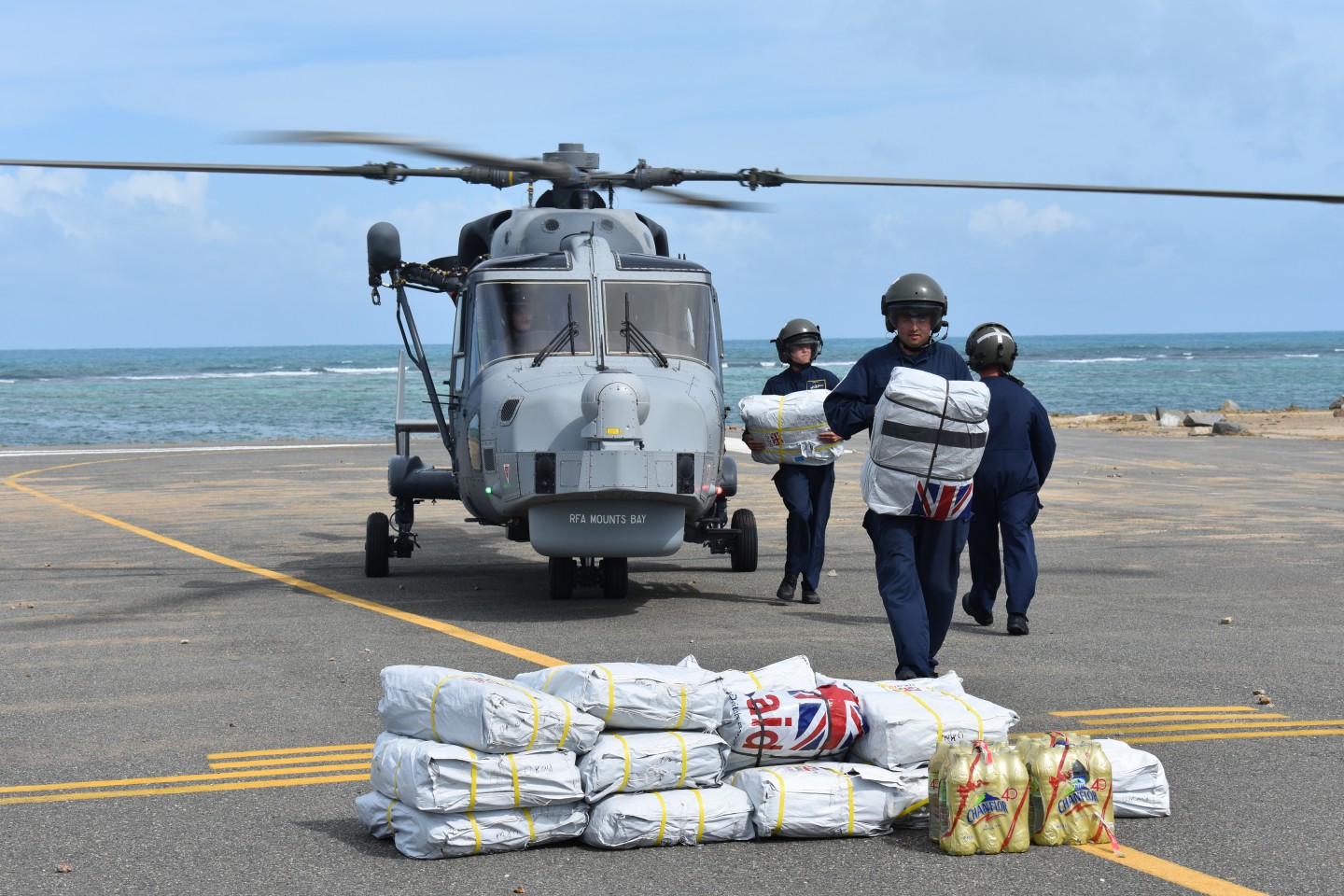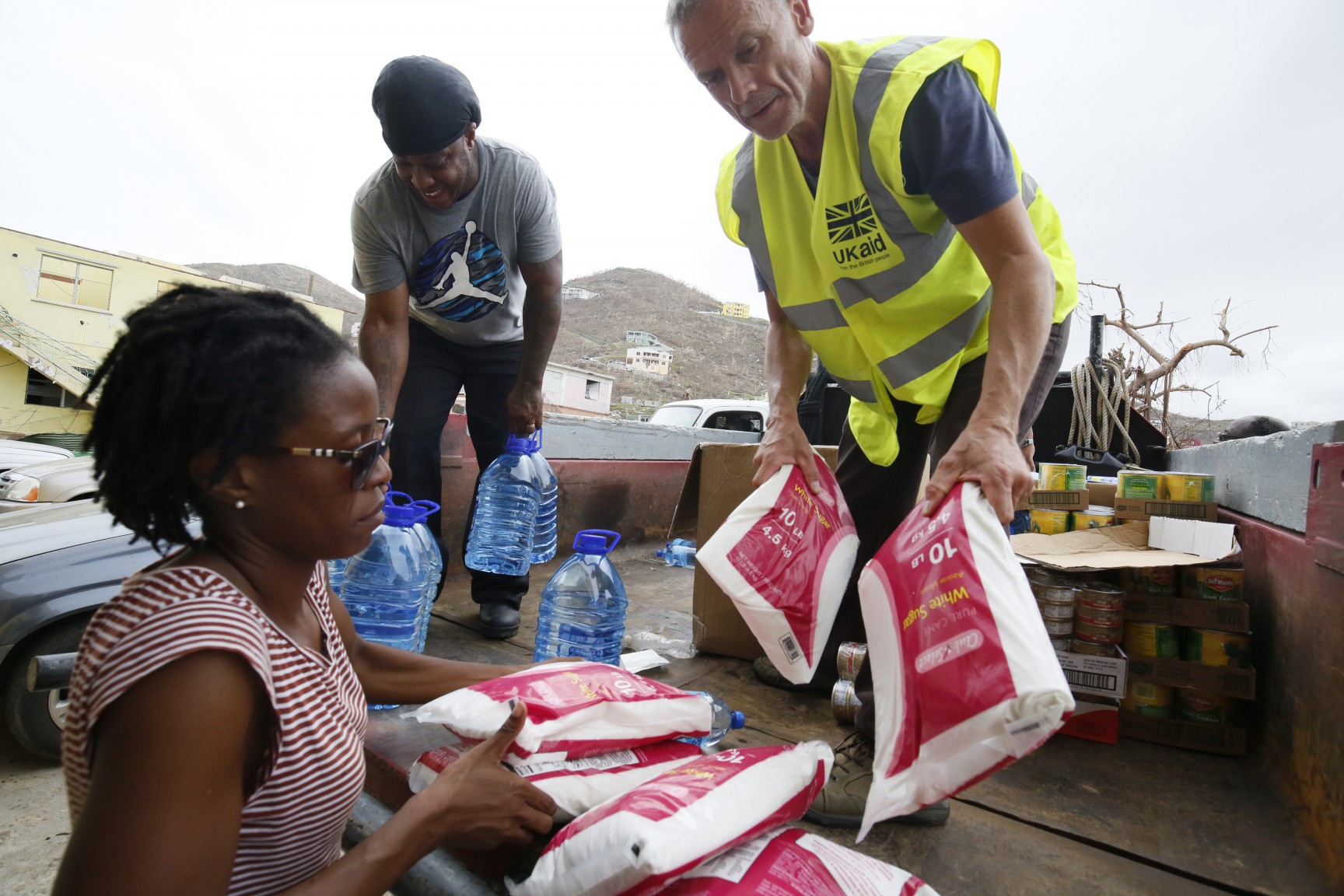with our monthly newsletter.
The Humanitarian & Stabilisation Operations Team provided life-saving aid to victims of Hurricane Irma in 2017.
Gabriella Waaijman, Director of Palladium’s Humanitarian Stabilisation and Operations Team, explores how profit and humanitarian aid go together, while keeping ethics at the forefront.
The private sector’s involvement in aid is nothing new, but its growing engagement and influence in the humanitarian sector is more recent.
When I joined Palladium after a long career with non-profits, I had to answer an uncomfortable question. Would I be able to work for a for-profit development company in the humanitarian sector? I had heard that the private sector is more efficient, brings new capacities, is better at managing risk, and has a more sustainable response model. I wanted to learn these new skills and keep an open mind to alternatives, but wasn’t sure that aid and profit should go together, no matter the outcome.
From Symptoms to Root Causes
The World Humanitarian Summit in 2016 concluded that in humanitarian aid, “Success must now be measured by how people’s vulnerability and risk are reduced, not by how needs are met year after year.” This statement opened the door for multi-faceted strategies and partnerships in the humanitarian sector at much greater scale than before. It caused a shift from centralised, unilateral aid delivery to stronger decentralised, market and network-based approaches. The needle was also moved from addressing symptoms to addressing root causes - a very good step.

Both shifts encouraged greater private sector engagement. This mindset change caused actors like the World Bank to enter the humanitarian space at a scale of which humanitarians could only dream. I remember gasping for air when I heard that the World Bank put a whopping two billion USD on the table for eight low income countries to “make a shift from crisis response to managing risks; support host communities and lagging regions; move towards social and economic inclusion; and take regional and country-level approaches.”
Existing humanitarian organisations were also forced to rapidly adopt new ways of working. There were increased opportunities for private sector engagement beyond service delivery, like security and logistics, or funding through Corporate Social Responsibility.
For example, market approaches had not been previously used in humanitarian contexts. But applying such approaches has actually brought new services to displaced populations and even enhanced their treatment as economic, social, and political participants.
Stronger Accountability to the Tax Paying Public
Another shift in recent years is that donor funding is increasingly channelled through contracts instead of grants with new methods like ‘payment by results’. This is predominantly in response to growing scepticism among the tax paying public about the way the aid industry is spending its money and a demand for greater accountability, due diligence, and value for money.
Contract-based funding transfers the risk of success or failure onto the contracted organisation, a risk that the financial models of non-profit organisations are not set-up to absorb.
In this brave new world of contracting, non-profits do not only have to accumulate sufficient reserves to deal with the risk of delivery failure; they also need to invest in organisational growth and diversification to keep up with changing humanitarian response strategies, innovation, new partnerships, and new required skillsets. The current non-profit financial model makes this very challenging.
The humanitarian and stabilisation contract that Palladium is implementing on behalf of the UK government, and for which I am responsible, provides a good example of these challenges. The cost of bidding was substantial. In order to deliver results under the program, the implementer must upfront significant amounts of money on an ongoing basis. The terms and conditions that govern the contract add a complexity to the program that required significant investment to meet, and in order to grow, diversify, innovate and adapt, Palladium will need to continue to invest. Having worked most of my career for non-profit organisations, I believe many would struggle to implement a contract of this complexity and financial risk.

The Ethics Question
Building up reserves, including by making a profit, is an effective and sustainable model for future humanitarian action. These reserves are necessary for organisations that need to take on financial risk, to invest in growth to keep up with the changes in the humanitarian space, and to upfront money to deliver large-scale programmes. But that only addresses some of the concerns about whether it is ethical to make a profit from humanitarian aid.
In the words of Hugo Slim, “effectiveness without ethics can be unethical. But, equally, ethics without effect can be unethical.” That tongue twister simply tells us that you can be brilliant at doing the wrong thing, or useless at doing the right thing, but neither are acceptable. Values are integral to effectiveness.
The humanitarian principles of humanity, neutrality, impartiality, and independence define what humanitarian aid is and are grounded in international humanitarian law. Humanity means that human suffering must be addressed. Neutrality means that assistance cannot favour one side in a conflict. Impartiality means that assistance must be provided based on need alone and without discrimination. And independence means that assistance must be free from political, economic, or military influence. Some of these principles seem obvious, but having worked in this field for many years, I know from experience that their implementation isn’t always clear-cut in the real world, with all its complexity.
For profit making organisations to effectively and ethically operate in humanitarian settings, they must adhere to the humanitarian principles. The same is true for non-profit actors. Ultimately, ethical legitimacy lies not in the organisation’s financial model but in the effectiveness of their programs and their accountability to both affected populations and the tax payers funding the aid.
Palladium manages the implementation of the Humanitarian Operations & Stabilisation Team, a program funded with UK aid from the British people.
with our monthly newsletter.
